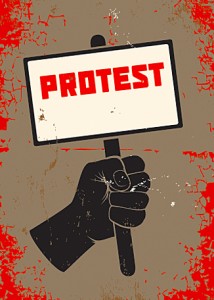
Disfavored speech: an act of expression not merely unpopular but outside the protection of the First Amendment and which may be prohibited or limited by legislation.
In January 2014, the U.S. Supreme Court heard oral arguments in the case of McCullen v. Coakley. At issue is the constitutionality of a Massachusetts law that bans even peaceable protesters within 35 feet of the entrances, exits and driveways of reproductive-health-care centers, not only on the facility’s private property but on adjacent public streets and sidewalks, too. The legislation is aimed at ensuring unobstructed access for patients and clinic staff.
“There have been a sufficient number of people killed and maimed and clinics burned down that we can see reason for a law like this,” says Mary Ann Dzuback, PhD, associate professor of education and director of Women, Gender and Sexuality Studies in Arts & Sciences. “It might be a different story if there were no history of violence.” In 1994, for example, antiabortion protester John C. Salvi III shot and killed two clinic workers and wounded five others outside two family planning centers in Brookline, Mass. The Massachusetts buffer-zone law was enacted six years later.
The case pits against each other two fundamental rights: free speech and abortion access. More broadly, the case prompts discussion about the circumstances under which it is permissible to limit expression.
“In a traditional public forum, the Supreme Court has recognized the greatest allowance for speech and the least concern for being left alone.”
John Inazu
For constitutional law expert John Inazu, JD, PhD, the physical setting in which the speech is carried out makes a great difference. “In a traditional public forum, the Supreme Court has recognized the greatest allowance for speech and the least concern for being left alone,” says Inazu, professor of law in the School of Law. He asserts that public spaces, such as sidewalks and streets, have long been viewed as a necessity for the open exchange of ideas.
The majority of Americans place high value on free speech. In the First Amendment Center’s 2013 State of the First Amendment Survey, 47 percent of Americans cited freedom of speech as the most important of the five freedoms it enumerates.
Still, the Supreme Court has upheld laws that limit speech — called time, place and manner restrictions — provided they are content neutral. For instance, the court ruled in Burson v. Freeman that buffer zones around polling places serve the state’s interest in protecting citizens’ right to vote freely. (Of note: That case was argued by Charles Burson, JD, senior lecturer in the School of Law.) Lower courts have upheld similar time, place and manner restrictions on Westboro Baptist Church protesters at funerals, but the Supreme Court hasn’t weighed in yet.
Though perhaps not in the manner of their choosing, the protesters’ argument is still heard, says Elizabeth Sepper, JD, LLM, associate professor of law in the School of Law. “There’s no evidence that abortion protesters have seen a falloff in the effectiveness of their protests due to current restrictions on how close they can get,” she says. “They are still highly visible and able to communicate their message.”
Historically, free speech has never existed without restrictions, says William Bubelis, PhD, assistant professor of classics in Arts & Sciences. The Western notion of free speech traces its roots to ancient Athens, Bubelis’ research focus. “Radically unpopular free speech played a key role in the political character of Athenian democracy,” he says. “But certain kinds of speech were already disfavored.” As early as 594 BC, restricted speech included speaking ill of others within a temple or at a religious festival. Conversely, slander was protected during trials and when performed as comedy. Even then, time, place and manner mattered.
Contested ideas will always draw passionate responses, says constitutional law expert Greg Magarian, JD, MPP, professor of law in the School of Law, and the expression of those arguments is vital. “The First Amendment is an outlet for change,” he says. “But we’re better on limiting censorship than we are on promoting debate.”